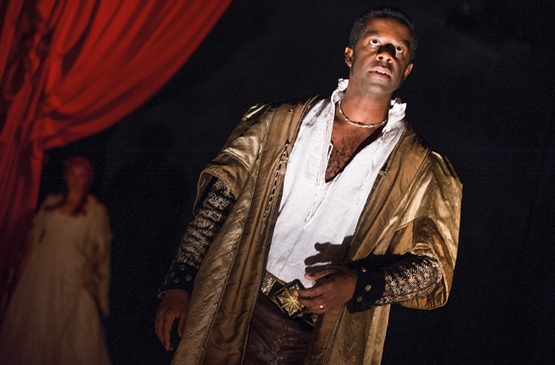I wasn't sure whether to post this here or on the R3 Arts thread (which includes drama) but I thought it would be an idea to have a thread complementing those on live concert and opera performances devoted to theatre: a thread in which people could comment on their theatrical experiences (and which would include watching live cinecasts of NT productions for instance). I'll start with my trip to the NT yesterday to see The Captain of Koepenick.
The Captain of Koepenick/Zuckmayer/NT/30/1/13
This play by Carl Zuckmayer was written in 1930 and was based on the true story of a down-and-out ex-con, Wilhelm Voigt, who in 1906 to escape arrest disguised himself in the uniform of a Prussian military captain and relying on the power of his uniform alone commandeered a troupe of Prussian guards and occupied the town hall of Koepenick. Voigt really wanted an identity pass but the town hall did not issue these documents so he took all the money in the treasury and escaped, leaving the soldiers guarding the officials. When he was arrested and the story came out there was a wave of public sympathy for his action, and the Kaiser, pleased with this demonstration of the German military's capacity for obedience, halved his sentence.
This play was put on at the NT over 40 years ago with Paul Scofield in the title role and a translation by John Mortimer, which cut the play considerably and made some revisions. This production uses a new translation by Ron Hutchinson and though I don't know the German original it seems (from various summaries and Zuckmayer's preface to the Mortimer translation) a more faithful adaptation. The set for the first act uses an expressionist backdrop of a lighted city a la Caligari. The play revolves mainly around Voight's exploits, his desperate attempts to secure an authorised identity as required by Prussian law and his final escapade, but the captain's uniform plays an increasingly important part. There is an obvious influence of Gogol's Government Inspector, but also perhaps of Kafka's nameless man ignored by an indifferent bureaucracy. Zuckmayer himself described it as a German fairy-tale, yet also a gentle satire (some contemporary critics thought it too gentle). The humour is also gentle, based on word play, irony and a sense of the ludicrous but with an underlying seriousness. There is a tragicomedy in the way in which all Voigt's efforts including his deception are devoted to asserting his identity, which he finally obtains in return for giving himself up.
This was a fine production of a great play, with Anthony Sher excellent as Voigt and many other good performances.
(apologies for lack of umlauts - posting this on a borrowed laptop)
The Captain of Koepenick/Zuckmayer/NT/30/1/13
This play by Carl Zuckmayer was written in 1930 and was based on the true story of a down-and-out ex-con, Wilhelm Voigt, who in 1906 to escape arrest disguised himself in the uniform of a Prussian military captain and relying on the power of his uniform alone commandeered a troupe of Prussian guards and occupied the town hall of Koepenick. Voigt really wanted an identity pass but the town hall did not issue these documents so he took all the money in the treasury and escaped, leaving the soldiers guarding the officials. When he was arrested and the story came out there was a wave of public sympathy for his action, and the Kaiser, pleased with this demonstration of the German military's capacity for obedience, halved his sentence.
This play was put on at the NT over 40 years ago with Paul Scofield in the title role and a translation by John Mortimer, which cut the play considerably and made some revisions. This production uses a new translation by Ron Hutchinson and though I don't know the German original it seems (from various summaries and Zuckmayer's preface to the Mortimer translation) a more faithful adaptation. The set for the first act uses an expressionist backdrop of a lighted city a la Caligari. The play revolves mainly around Voight's exploits, his desperate attempts to secure an authorised identity as required by Prussian law and his final escapade, but the captain's uniform plays an increasingly important part. There is an obvious influence of Gogol's Government Inspector, but also perhaps of Kafka's nameless man ignored by an indifferent bureaucracy. Zuckmayer himself described it as a German fairy-tale, yet also a gentle satire (some contemporary critics thought it too gentle). The humour is also gentle, based on word play, irony and a sense of the ludicrous but with an underlying seriousness. There is a tragicomedy in the way in which all Voigt's efforts including his deception are devoted to asserting his identity, which he finally obtains in return for giving himself up.
This was a fine production of a great play, with Anthony Sher excellent as Voigt and many other good performances.
(apologies for lack of umlauts - posting this on a borrowed laptop)




Comment